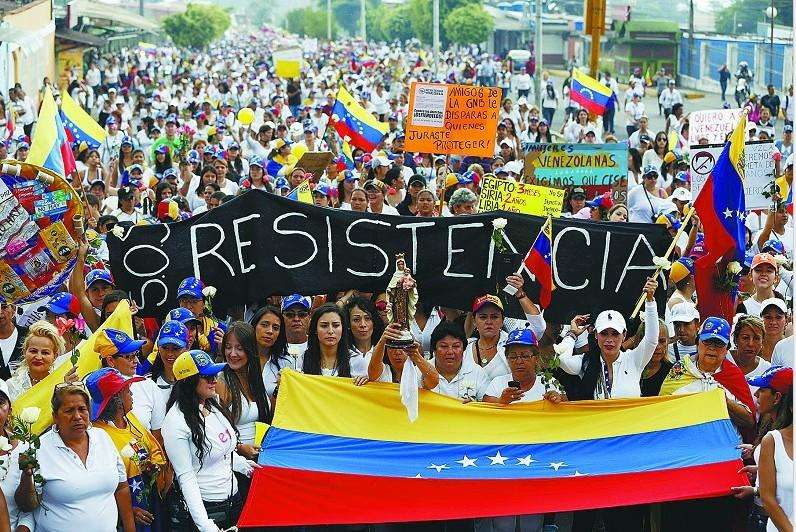(单词翻译:单击)
JUDY WOODRUFF: Thousands of Venezuelans took to the streets in protest again today. Two demonstrators were killed, as a political crisis in this failing state deepens.
Our chief foreign affairs correspondent, Margaret Warner, reports.
MARGARET WARNER: Organizers dubbed it the Mother of All Marches. Hundreds of thousands of opponents to socialist President Nicolas Maduro flooded Caracas.
RICHARD BLANCO, Opposition Lawmaker (through interpreter): Today, people are in the street demonstrating peacefully, seeking a democratic exit to a situation that is already overflowing. Here, the president of the republic is playing with fire.
MARGARET WARNER: The peace was broken almost immediately, as protesters clashed with police and government supporters. National Guard troops fired tear gas, and a teenage boy died after being shot in the head.
Demonstrators have tried repeatedly in recent days to reach the capital city's downtown. Each time, they were turned back by riot police. At least five people were killed, and hundreds arrested.
Brian Ellsworth of Reuters, speaking to us by Skype from Caracas, said tensions have been building.
BRIAN ELLSWORTH, Reuters: This has been sort of the culmination of that, about two-and-a-half weeks of all these demonstrations. The opposition called this big demonstration and said, all over the country, we need to be protesting against the government.
MARGARET WARNER: These latest protests erupted last month, after the pro-government Supreme Court took over the powers of the national legislature controlled by the opposition. After an international outcry, the court reversed itself. But the criticism continued.
JULIO BORGES, President, Venezuelan National Assembly (through interpreter): They haven't done anything. The Supreme Court has installed a coup d'etat it cannot correct.

MARGARET WARNER: The oil-rich nation is also mired in an economic crisis, with skyrocketing, triple-digit inflation, rampant crime and food shortages.
The opposition wants Maduro's removed, new elections and the release of political prisoners, including opposition leader Leopoldo Lopez, who was jailed in early 2014. In February, Lopez's wife went to the White House with Florida Senator Marco Rubio. President Trump tweeted a photo with her, saying: "Venezuela should allow Leopoldo Lopez, a political prisoner, out of prison immediately."
That same month, the U.S. Treasury Department designated Venezuelan Vice President Tareck El Aissami for sanctions on drug trafficking charges.
Secretary of State Rex Tillerson today:
REX TILLERSON, Secretary of State: We are concerned that the government of Maduro is violating its own Constitution and is not allowing the opposition to have their voices heard.
MARGARET WARNER: Maduro has blamed the U.S. for trying to foment a coup.
PRESIDENT NICOLAS MADURO, Venezuela (through interpreter): The time for combat has arrived, my fellow patriots. The hour has arrived to decide the future and the destiny of our country.
MARGARET WARNER: Maduro came to power four years ago, upon the death of his charismatic predecessor, Hugo Chavez. Maduro has struggled ever since. Chavez himself survived a brief coup in 2002, and accused the United States of trying to subvert him.
Riding on high world oil prices, Chavez had created subsidies and price controls, raising living standards for the poor, but no longer.
Again, Brian Ellsworth:
BRIAN ELLSWORTH: Once oil prices collapsed in 2014, the country basically hadn't saved money during the oil boom. Private enterprise has a really hard time producing goods and services, which means we basically don't have them.
MARGARET WARNER: The Maduro regime is also under pressure from its Latin American neighbors. Eleven countries called this week for a time frame to hold elections.
For the PBS NewsHour, I'm Margaret Warner.


